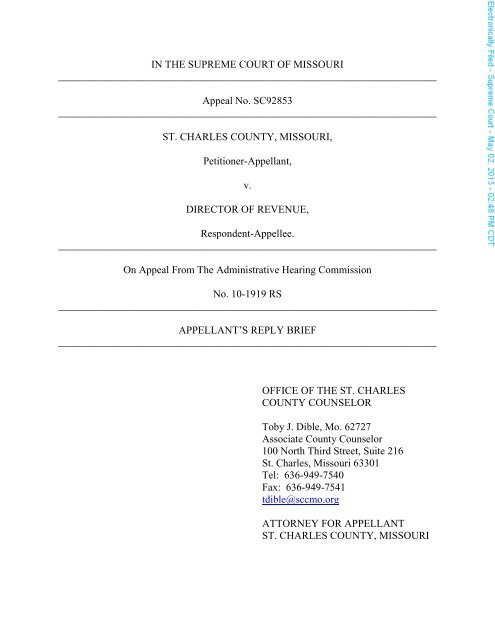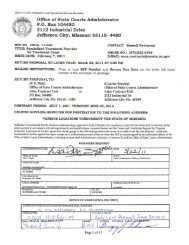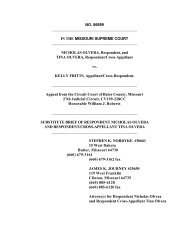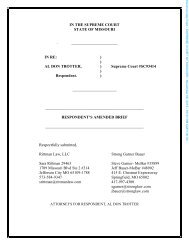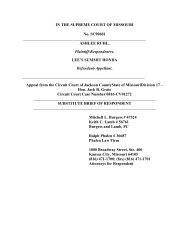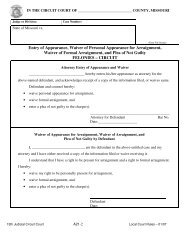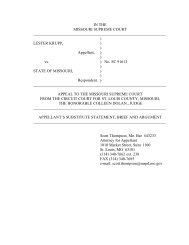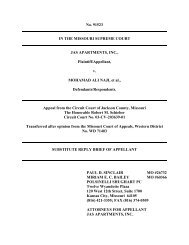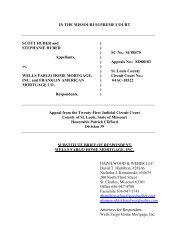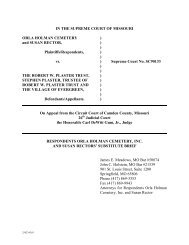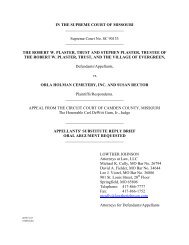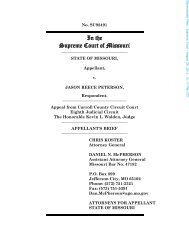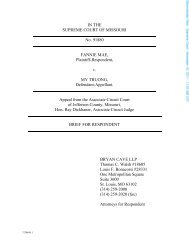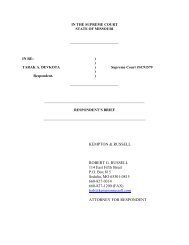IN THE SUPREME COURT OF MISSOURI Appeal No. SC92853 ___
IN THE SUPREME COURT OF MISSOURI Appeal No. SC92853 ___
IN THE SUPREME COURT OF MISSOURI Appeal No. SC92853 ___
Create successful ePaper yourself
Turn your PDF publications into a flip-book with our unique Google optimized e-Paper software.
<strong>IN</strong> <strong>THE</strong> <strong>SUPREME</strong> <strong>COURT</strong> <strong>OF</strong> <strong>MISSOURI</strong><br />
________________________________________________________________________<br />
<strong>Appeal</strong> <strong>No</strong>. <strong>SC92853</strong><br />
________________________________________________________________________<br />
ST. CHARLES COUNTY, <strong>MISSOURI</strong>,<br />
Petitioner-Appellant,<br />
v.<br />
DIRECTOR <strong>OF</strong> REVENUE,<br />
Respondent-Appellee.<br />
________________________________________________________________________<br />
On <strong>Appeal</strong> From The Administrative Hearing Commission<br />
<strong>No</strong>. 10-1919 RS<br />
________________________________________________________________________<br />
APPELLANT‘S REPLY BRIEF<br />
________________________________________________________________________<br />
<strong>OF</strong>FICE <strong>OF</strong> <strong>THE</strong> ST. CHARLES<br />
COUNTY COUNSELOR<br />
Toby J. Dible, Mo. 62727<br />
Associate County Counselor<br />
100 <strong>No</strong>rth Third Street, Suite 216<br />
St. Charles, Missouri 63301<br />
Tel: 636-949-7540<br />
Fax: 636-949-7541<br />
tdible@sccmo.org<br />
ATTORNEY FOR APPELLANT<br />
ST. CHARLES COUNTY, <strong>MISSOURI</strong>
TABLE <strong>OF</strong> CONTENTS<br />
Page <strong>No</strong>.<br />
REPLY ARGUMENT ......................................................................................................... 1<br />
I. Introduction ............................................................................................................ 1<br />
II.<br />
The Commission Rejected Respondent's Invitation to Add Language to the<br />
Exemption and Find That "All the Proceeds" Must Mean "Gross Receipts," and<br />
This Court Should, Too. ........................................................................................ 1<br />
III.<br />
Respondent Improperly Equates "Strict Construction" To "Narrow<br />
Construction". ........................................................................................................ 3<br />
IV.<br />
Respondent Wholly Ignores the Private Benefit Doctrine Discussed Extensively<br />
in Appellant's Brief Because It Is Clear That the Conduct of the Arena's Business<br />
Does <strong>No</strong>t Present the Harm That the Limiting Language of the Exemption Was<br />
Intended to Avoid.. ................................................................................................ 6<br />
V. For All the Reasons Articulated in Appellant's Brief, Merchandise and<br />
Concessions Sales Clearly Fall Within Section 144.030.2(17) in That They Are<br />
"Fees" or "Other Charges" Paid In or For a Place of Amusement. ..................... 10<br />
VI.<br />
Respondent Cites <strong>No</strong> Authority for the Proposition That the County Is <strong>No</strong>t A<br />
Proper Refund Claimant <strong>No</strong>r for the Proposition That the Proper Remedy Is the<br />
Uniform Disposition of Unclaimed Property Act, §§ 447.500 et seq. RSMo. .... 12<br />
CONCLUSION ................................................................................................................. 15<br />
CERTIFICATE <strong>OF</strong> COMPLIANCE ................................................................................ 17<br />
CERTIFICATE <strong>OF</strong> SERVICE .......................................................................................... 18<br />
-i-
TABLE <strong>OF</strong> AUTHORITIES<br />
Page <strong>No</strong>.<br />
Cases<br />
Bolivar Road News, Inc. v. Dir. of Revenue, 13 S.W.3d 297 (Mo. banc 2000) ............... 2-3<br />
Buchholz Mortuaries, Inc. v. Dir. of Revenue, 113 S.W.3d 192 (Mo. banc 2003) ........... 15<br />
City of Jefferson Dept. of Parks and Recreation v. Dir. of Revenue, 1992 WL 390471,<br />
<strong>No</strong>. 92-00042RV (Mo.Admin.Hrg.Com. Dec. 23, 1992) ........................................... 11<br />
City of Springfield v. Dir. of Revenue, 659 S.W.2d 782 (Mo. banc 1983) .................. 11-13<br />
Director of Revenue v. Armco, Inc., 787 S.W.2d 722 (Mo. banc 1990) ......................... 3-4<br />
Godwin v. Dir. of Revenue, 1991 WL 128051, <strong>No</strong>. 90-000864RS (Mo.Admin.Hrg.Com.<br />
April 10, 1991) ....................................................................................................... 5, 7, 12<br />
May Dept. Stores Co. v. Dir. of Revenue, 791 S.W.2d 388 (Mo. banc 1990) ................. 3-4<br />
<strong>No</strong>rwin G. Heimos Greenhouse, Inc. v. Dir. of Revenue, 724 S.W.2d 505 (Mo. banc<br />
1987) ........................................................................................................................ 12-14<br />
St. Louis Country Club v. Administrative Hearing Comm'n, 657 S.W.2d 614 (Mo. banc<br />
1983) ............................................................................................................................. 13<br />
Stallman v. Robinson, 260 S.W.2d 743 (Mo. 1953) ............................................................ 9<br />
State ex rel. American Family Mut. Ins. Co. v. Clark, 106 S.W.3d 483 (Mo. banc 2003)<br />
........................................................................................................................................ 15<br />
State ex rel. GTE <strong>No</strong>rth, Inc. v. Missouri Public Service Comm’n, 835 S.W.2d 356 (Mo.<br />
App. W.D. 1992) ........................................................................................................... 10<br />
State v. Burrington, 371 S.W.2d 319 (Mo. 1963) ............................................................... 9<br />
-ii-
State v. Strong, 142 S.W. 3d 702 (Mo. banc 2004) ............................................................. 9<br />
Wetterau, Inc. v. Dir. of Revenue, 843 S.W.2d 365 (Mo. banc 1992) ............................... 9<br />
Zoological Park Subdistrict v. Dir. of Revenue, 1991 WL 154843, <strong>No</strong>. 90-000490RS<br />
(Mo.Admin.Hrg.Com. June 10, 1991) .......................................................................... 11<br />
Statutes<br />
Missouri Constitution, Article III, Section 39(10) ............................................................ 12<br />
Section 144.010 RSMo. ............................................................................................... 11, 14<br />
Section 144.020 RSMo. ............................................................................................ 2, 11-12<br />
Section 144.021 RSMo. ..................................................................................................... 13<br />
Section 144.030.2 RSMo. ........................................................................................... passim<br />
Section 144.190 RSMo. ..................................................................................................... 14<br />
Section 447.500 et seq. RSMo. .............................................................................. 12, 14-15<br />
Regulations and Other Authorities<br />
C.F.R. § 1.501(c)(3)-1(d)(1)(ii) ....................................................................................... 6-7<br />
G.C.M. 39598 (Jan. 23, 1987)(available at http://www.legalbitstream.com/scripts/<br />
isyswebext.dll?op=get&uri=/isysquery/irl6fcd/9/doc ) .................................................. 7<br />
Webster's Third New International Dictionary, 377 (1993). ........................................... 10<br />
-iii-
REPLY ARGUMENT<br />
I. Introduction<br />
Appellant St. Charles County, Missouri (―County‖) is entitled to a refund of sales<br />
taxes paid on sales in and for the St. Charles County Family Arena (―Arena‖) under<br />
Section 144.030.2(17) RSMo. (now section 144.030.2(18)) which exempts from sales tax<br />
fees and charges in or for a place of amusement, entertainment or recreation, games or<br />
athletic events owned or operated by a political subdivision. 1<br />
II.<br />
The Commission Rejected Respondent’s Invitation to Add Language to the<br />
Exemption and Find That “All The Proceeds” Must Mean “Gross Receipts,”<br />
and This Court Should, Too.<br />
The crux of Respondent‘s Brief argues that the Court must find the term ―all the<br />
proceeds‖ actually means ―gross receipts.‖ 2<br />
But Respondent already raised this<br />
argument, and the Commission squarely rejected it.<br />
1 As it did in its principle brief, the County will refer to the exemption herein as Section<br />
144.030.2(17) since that was the version of the statute in effect at all times relevant to this<br />
case. See Appellant‘s Brief, p. 12 at fn. 6.<br />
2 See Resp. Brief, e.g., at p. 19 (―B. The Terms ‗All the Proceeds‘ Cannot Mean Net<br />
Proceeds, But Must Mean Gross Receipts‖), at p. 21 (―most apt definition of ‗proceeds‘<br />
is…in this context, ‗gross receipts.‘‖), and at p. 24 (―narrow construction of the<br />
exemption…would render the terms ‗all the proceeds‘ to be equivalent with ‗gross<br />
receipts‘‖).<br />
- 1 -
Curiously, Respondent acknowledges that courts should not add words to a statute<br />
under the auspice of statutory construction. Resp. Brief, p. 22. Yet that is exactly what it<br />
would have this Court do by finding the term ―all the proceeds‖ actually means ―gross<br />
receipts.‖ Indeed, the General Assembly certainly knows how to use the term ―gross<br />
receipts.‖ It is a specifically defined technical term in Chapter 144. Yet the General<br />
Assembly chose not to use it in section 144.030.2(17). That choice is presumed<br />
intentional. See Appellant‘s Brief, p. 16 at fn. 7. The exemption for sales of handicraft<br />
items in section §133.030.2(24) further highlights this—that section uses the term ―gross<br />
proceeds.‖ This means that the General Assembly meant something different by using<br />
the term ―all the proceeds‖ in section 144.030.2(17). In contrast to section<br />
144.030.2(24), the exemption language at issue here does not use the term ―gross<br />
receipts‖ or ―gross proceeds‖ at all.<br />
Respondent cites Bolivar Road News, Inc. v. Dir. of Revenue, 13 S.W.3d 297 (Mo.<br />
banc 2000), for the proposition that this Court has used the terms ―proceeds‖ and ―gross<br />
receipts‖ interchangeably. Resp. Brief, p. 25. But Bolivar is distinguishable. The issue in<br />
Bolivar was whether the adult book store, by virtue of operating coin-operated video<br />
booths, was a ―place of amusement, entertainment or recreation,‖ subject to tax under<br />
section 144.020.1(2). Bolivar did not even mention, must less construe, the exemption at<br />
issue here. Indeed, here there is no dispute that the Arena is a ―place of amusement.‖ See<br />
Appellant‘s Brief, pp. 15-16. The question is whether or not it is entitled to the<br />
exemption in section 144.030.2(17), which turns on the definition of the term ―all the<br />
- 2 -
proceeds‖ and whether ―all the proceeds‖ benefit the County and do not inure to any<br />
private entities. Id.<br />
In Bolivar, the Court was presumably far less concerned with any distinction<br />
between the terms ―proceeds‖ versus ―receipts‖ versus ―gross sales‖—the issue on appeal<br />
was whether the arcade was a taxable place of amusement in the first instance. In fact, in<br />
all likelihood the Court utilized the term ―receipts‖ because, as Respondent‘s Brief points<br />
out, ―Bolivar‘s bookkeeping noted the video booth receipts as ‗Arcade Receipts.‘‖ Resp.<br />
Brief, p. 25.<br />
Bolivar simply does not support the contention and Respondent cannot otherwise<br />
demonstrate that the exemption language ―all the proceeds‖ means ―gross receipts.‖ On<br />
the contrary, the plain language of and legislative intent behind the exemption<br />
demonstrate that ―all the proceeds derived therefrom‖ means the Arena‘s proceeds after<br />
payment of its operational expenses, including the expense of bringing entertainment and<br />
athletic events to the Arena. See Appellant‘s Brief, pp. 16-19.<br />
III.<br />
Respondent Improperly Equates “Strict Construction” To “Narrow<br />
Construction.”<br />
Respondent does not cite any authority for the proposition that ―strict<br />
construction‖ means ―narrow construction.‖ See fn. 1; see also Resp. Brief, p. 21 (―the<br />
language of the statute is to be strictly or narrowly construed‖), and at p. 29 (―…much<br />
less the narrow construction that must be afforded the terms‖). The taxing statutes are to<br />
be strictly construed against the state, May Dept. Stores Co. v. Dir. of Revenue, 791<br />
S.W.2d 388, 389 (Mo. banc 1990), and tax exemptions are strictly construed against the<br />
- 3 -
claimant. Director of Revenue v. Armco, 787 S.W.2d 722, 724 (Mo. banc 1990). But the<br />
polestar is always the legislature‘s intent. Id. To give effect to that intent, one must not<br />
necessarily construe the exemption narrowly, but rather consider the words used in the<br />
statute in their plain and ordinary meaning. May Dept. Stores, 791 S.W.2d at 389.<br />
Respondent argues for a narrow interpretation of the exemption such that it would<br />
apply so long as proceeds are used only to pay County employees and no other private<br />
person, firm or corporation. Resp. Brief, p. 26. But this, too, is an argument expressly<br />
rejected by the Commission. Respondent itself points out that ―the Commission held that<br />
‗all the proceeds‘ must mean essentially gross receipts minus the amounts used to ‗pay an<br />
independent contractor an amount equivalent to the fair market value of services<br />
rendered.‘‖ Id. Isn‘t that exactly what the County has done? Indeed it is. The<br />
agreements between the County and the acts and event promoters generally provide that<br />
the relationship of the parties is as independent contractors. See Appellant‘s Brief, p. 6<br />
citing Stip. 231, 326, 634-35. All other work done in and for the Arena is generally done<br />
by full-time County employees, part-time hourly employees such as ticket-takers and setup<br />
crews called in to work a particular event, or volunteer groups. 3<br />
3 See Stip. 126-127; 143-171. In particular, the County budgets for 2007, 2008, and 2009<br />
demonstrate the County appropriates between $340,000.00 and $548,301.000 for hourly<br />
employees. Stip. 147, 153, 162. The County also contracts with concession volunteer<br />
groups (charitable organizations such as Greyhound Rescue or Make-A-Wish) which<br />
provide volunteers so that their organization can receive funds from operating concession<br />
- 4 -
Respondent further argues that the foregoing must be what the General Assembly<br />
―contemplated by the exemption based on the examples given in § 144.030.2(17) –<br />
‗museums, fairs, zoos and planetariums‘…‖, where independent contracting is, according<br />
to Respondent, not commonly necessary. Resp. Brief, p. 26. But those are indeed merely<br />
examples. Respondent wholly ignores that the exemption exempts from sales taxes ―any<br />
place of amusement, entertainment or recreation, games or athletic events.‖ Section<br />
144.030.2(17) (emphasis added).<br />
Respondent‘s interpretation would mean, for example, that individual players on<br />
athletic teams brought to the Arena would have to be employed by the County. Surely<br />
that is not the result the General Assembly intended. On the contrary, the legislative<br />
intent behind section 144.030.2(17) is better understood to exempt from sales tax<br />
amounts paid in or for municipally-owned and operated recreational facilities, just like<br />
the Arena, allowing for payment to independent contractors for certain services. See, e.g.,<br />
Godwin v. Dir. of Revenue, 1991 WL 128051, *4, <strong>No</strong>. 90-000864RS<br />
(Mo.Admin.Hrg.Com. April 10, 1991)(―The purpose of this exemption is to spare<br />
transactions at certain public facilities from the sales tax. … The exemption depends,<br />
therefore, on whether the transaction takes place at a government facility or at a private<br />
enterprise.‖).<br />
stands, medical personnel to handle illness or injury during events, interpreters for the<br />
deaf, etc. Id.<br />
- 5 -
Respondent further argues for ―narrow construction‖ relying on section<br />
144.030.2(38) stating, ―if the provisions of § 144.030.2(17) really did mean net proceeds<br />
as the County argues, then why would the legislature include the exemption in §<br />
144.030.2(38) since a collegiate athletic event would already be exempt under §<br />
144.030.2(17)?‖ Resp. Brief, pp. 27-28. But section 144.030.2(38) is clearly a wholly<br />
different exemption, most importantly because it applies to events held in facilities<br />
owned or operated not only by a municipality or other political subdivision (as in section<br />
144.030.2(17)), but also by any other governmental authority or commission, a quasigovernmental<br />
agency, a state university or college or by the state. Section 144.030.2(38)<br />
is further distinguishable because it exempts from sales tax only tickets (as opposed to all<br />
amounts paid in or for the venue) for collegiate athletic championship events only, and<br />
where the venue is a neutral site and the event could otherwise be taken out-of-state.<br />
IV.<br />
Respondent Wholly Ignores the Private Benefit Doctrine Discussed<br />
Extensively in Appellant’s Brief Because It Is Clear That the Conduct of the<br />
Arena’s Business Does <strong>No</strong>t Present the Harm That the Limiting Language of<br />
the Exemption Was Intended to Avoid.<br />
It is noteworthy that Respondent‘s Brief fails to even mention, much less refute,<br />
the authority proffered in Appellant‘s Brief related to the private benefit doctrine and the<br />
harm that the limiting language of section 144.030.2(17) was actually intended to avoid.<br />
See Appellant‘s Brief, pp. 19-27.<br />
Indeed, the term ―inure‖ is best understood to mean that the organization is not<br />
exempt ―if more than an insubstantial part of its activities is not in furtherance of an<br />
- 6 -
exempt purpose,‖ C.F.R. § 1.501(c)(3)-1(d)(1)(ii)(as amended in 1990), or ―if it serves a<br />
private interest more than incidentally.‖ G.C.M. 39598 (Jan. 23, 1987), p. 14. An<br />
incidental private benefit is, in turn, one that is ―a necessary concomitant of the activity<br />
which benefits the public at large‖ and is insubstantial ―after considering the overall<br />
public benefit conferred by the activity.‖ Id. at 15-16. The Commission has recognized,<br />
furthermore, that the intent of the limiting language in section 144.030.2(17) is to prevent<br />
private persons from taking advantage of the exemption by leasing a public facility and<br />
all rights to the proceeds. Godwin, 1991 WL 128051 at *4.<br />
The Arena‘s business simply does not present the type of harm that the limiting<br />
―inurement‖ language of section 144.030.2(17) was intended to avoid. Indeed, the Arena<br />
is a place of amusement wholly owned and operated by the County. See Appellant‘s<br />
Brief, p. 3. The County does not contract with a management company to oversee the<br />
Arena or maximize and share its profits; rather, the County itself solicits acts and event<br />
promoters to come to the Arena to fulfill its purpose as a public amenity, and in the<br />
process attempt to simply cover its operational costs, which it is often unable to do. Id. at<br />
pp. 3-5. 4<br />
The economic realities of the entertainment market compel the County to<br />
4 Respondent points out the net revenues generated by some of the example events<br />
provided in the record. Resp. Brief, p. 9. But it assiduously fails to point out the net<br />
profits/losses once the operational expenses are accounted for, which demonstrate the<br />
complete picture. See Stip. 746 (net loss of $11,098.36), 748 (net loss of $24,747.40), 750<br />
(net loss of $39,636.96), 754 (net profit of $13,386.32), and 924 (net loss of $26,180.09).<br />
- 7 -
negotiate competitively to bring acts to the Arena. But the benefit to outsiders under the<br />
Arena‘s circumstances is simply an incidental, ―necessary concomitant‖ to the Arena‘s<br />
ability to operate for the public benefit. 5<br />
And, the Arena most certainly benefits from all<br />
proceeds derived therefrom.<br />
Respondent argues that the County‘s reading of the exemption would produce an<br />
absurd result in that a municipality could simply write its contracts with third parties to<br />
treat any money that does not ultimately go to the municipality as a cost or expense<br />
5 Respondent also provides an incomplete and misleading quotation from some sample<br />
Family Arena agreements in the record. At p. 2, Respondent‘s Brief states, ―These<br />
agreements provide that the compensation for the performers or promoters (Licensees)<br />
‗shall include all amounts due to Licensee form (sic) all ticket sales or box office<br />
receipts.‘‖ In fact, this is but a fragment of a sentence in the provision of the agreements<br />
that deals with nonresident entertainer compensation tax. The full quotation is:<br />
Licensee‘s total compensation for purposes of calculating the amount to<br />
be withheld by Arena under this paragraph shall include all amounts<br />
due to Licensee form (sic) all ticket sales or box office receipts (after<br />
satisfaction of all of Licensee‘s obligations pursuant to this Agreement)<br />
and any other amounts which shall be paid from Arena to Licensee as<br />
compensation for Licensee‘s ―Event.‖<br />
Stip. 220, 315, 634-35 (emphasis added). Most importantly, the nonresident entertainer<br />
compensation tax has nothing to do with this appeal.<br />
- 8 -
which benefits the County as opposed to a proceed that inures to a private person, firm or<br />
corporation. Resp. Brief, p. 23. 6<br />
The County submits that the opposite is in fact true: the<br />
reasonable, natural and practical interpretation of the statute in light of modern conditions<br />
would recognize the fact that there must be incidental incentives to third parties in<br />
operating a public place of amusement like the Arena. Wetterau, Inc. v. Dir. of Revenue,<br />
843 S.W.2d 365, 367 (Mo. banc 1992).<br />
6 Respondent‘s Brief, p. 23 at fn. 4, cites to a newspaper article for the proposition that<br />
the County ―believes‖ the City of St. Charles should receive local sales taxes even though<br />
the County ―believes‖ it is entitled to the exemption from the State, and Respondent<br />
further cites the article for the proposition that ―the County stated that it would continue<br />
to receive their local sales taxes on the sales.‖ As a preliminary matter, the article is not<br />
in the record in this case and Respondent‘s reference to it is therefore wholly improper<br />
and should not be considered by the Court. See State v. Strong, 142 S.W.3d 702, 728-29<br />
(Mo. banc 2004)(sustaining the State‘s motion to strike references to a newspaper article<br />
that was outside the record on appeal) citing State v. Burrington, 371 S.W.2d 319, 320-21<br />
(Mo. 1963); see also Stallman v. Robinson, 260 S.W.2d 743, 284 (Mo. 1953)(a<br />
newspaper article is not admissible as evidence of the facts stated therein). Furthermore,<br />
Respondent attributes statements to the County which were not made by the County. In<br />
fact, the statements referenced in Respondent‘s Brief were factual statements averred by<br />
the reporter, not attributed to any County official or spokesperson.<br />
- 9 -
V. For All the Reasons Articulated in Appellant’s Brief, Merchandise and<br />
Concessions Sales Clearly Fall Within Section 144.030.2(17) in That They Are<br />
“Fees” or “Other Charges” Paid In or For a Place of Amusement.<br />
Respondent fails to appreciate the breadth of the exemption on this point. Section<br />
144.030.2(17) exempts ―all amounts paid or charged for admission or participation or<br />
other fees paid by or other charges to individuals in or for any placement of<br />
amusement…” (emphasis added).<br />
First, Respondent argues that sales of tangible personal property (―merchandise‖)<br />
and food and beverages (―concessions‖) are not ―fees‖ or ―other charges‖ paid in or for a<br />
place of amusement based upon the dictionary definitions of those terms. Resp. Brief at<br />
pp. 29-31. But even the dictionary definitions proffered by Respondent do not support<br />
such a claim. The cited definitions for the term ―charge,‖ for example, include:<br />
―expenditure,‖ ―money paid out,‖ ―the price demanded for a thing or service,‖ and<br />
―something that is debited.‖ Id., citing Webster’s Third New International Dictionary 377<br />
(1993) (emphasis added). It is difficult to see how sales for merchandise and/or<br />
concessions do not meet these various definitions.<br />
Next Respondent states, as the Commission did, that the Commission is not<br />
obligated to follow the reasoning of prior decisions which clearly weigh in favor of the<br />
County here. Resp. Brief, pp. 31-33. Respondent ignores the County‘s citation to State<br />
ex rel. GTE <strong>No</strong>rth, Inc. v. Missouri Public Service Comm’n, 835 S.W.2d 356, 371 (Mo.<br />
App. W.D. 1992)(citation omitted), which states that while this Court is not generally<br />
obliged to concern itself with inconsistencies between current and prior decisions of an<br />
- 10 -
administrative agency, it is if the complained-of decision is arbitrary or unreasonable.<br />
Here, the Commission‘s findings were arbitrary and unreasonable in light of Zoological<br />
Park Subdistrict v. Dir. of Revenue, 1991 WL 154843, <strong>No</strong>. 90-000490RS<br />
(Mo.Admin.Hrg.Com. June 10, 1991) (exempting merchandise and concessions sales)<br />
and City of Jefferson Dept. of Parks and Recreation v. Dir. of Revenue, 1992 WL<br />
390471, <strong>No</strong>. 92-00042RV (Mo.Admin.Hrg.Com. Dec. 23, 1992) (exempting concessions<br />
sales).<br />
Furthermore, there is simply no merit to Respondent‘s statement that Appellant‘s<br />
Brief mischaracterized this Court‘s opinion in City of Springfield v. Dir. of Revenue, 659<br />
S.W.2d 782 (Mo. banc 1983). See Resp. Brief, p. 32 (―This is not at all what the Court<br />
stated…‖). To be clear, City of Springfield states:<br />
… it is completely obvious that the tax is properly ordained by the<br />
application of §§ 144.010.1(2), (5), (8)(a) and (9), which define<br />
―business‖, ―person‖, ―sale at retail‖ and ―seller‖ subject to the sales tax<br />
in such terms as to include the City in this instance.<br />
Section<br />
144.020.1(2) brings the items of sales and the recreational activities<br />
within the purview of the taxing statute.<br />
Id. at 784.<br />
Finally, Respondent argues that merchandise and concessions sales are not exempt<br />
―fees‖ or ―other charges‖ because ―all the proceeds [therefrom] do not benefit the County<br />
in this case, but inure, in part, to private persons, firms or corporations.‖ Resp. Brief, pp.<br />
33-34. This argument fails as set forth comprehensively in the County‘s principle brief.<br />
- 11 -
See, e.g., Appellant‘s Brief at pp. 27-29 (all proceeds derived from the Arena do benefit<br />
the County and do not ―inure‖, as that term is understood in this context, to the benefit of<br />
private persons, firms or corporations; furthermore, such a finding is directly<br />
contradictory to Godwin, where the Commission found that a mere ―money handling<br />
arrangement‖ pursuant to which the City paid Godwin his percentage of amounts<br />
collected ―does not create the mischief the limiting language [of section 144.030.2(17)]<br />
was designed to avoid.‖ 1991 WL 128051 at *4).<br />
In sum, merchandise and concessions sales are clearly ―fees‖ or ―other charges‖<br />
under section 144.030.2(17), and the Commission erred in finding otherwise.<br />
VI.<br />
Respondent Cites <strong>No</strong> Authority for the Proposition That the County Is <strong>No</strong>t A<br />
Proper Refund Claimant <strong>No</strong>r for the Proposition That the Proper Remedy Is<br />
the Uniform Disposition of Unclaimed Property Act, §§ 447.500 et seq. RSMo.<br />
Respondent cites <strong>No</strong>rwin G. Heimos Greenhouse, Inc. v. Dir. of Revenue, 724<br />
S.W.2d 505 (Mo. banc 1987) for the proposition that the refund the County seeks in this<br />
case ―belongs to unnamed customers of the Arena who paid the tax over the years in<br />
question.‖ Resp. Brief, p. 35. 7<br />
But <strong>No</strong>rwin does not say that at all. In fact, <strong>No</strong>rwin says<br />
7 Respondent also cites to City of Springfield, supra to state that its argument is true<br />
―even when the entity collecting the sales tax is a political subdivision.‖ Resp. Brief, p.<br />
35. But City of Springfield simply held that the imposition of sales tax pursuant to<br />
section 144.020.1(2) on ―recreational sales‖ at a municipally-owned golf course did not<br />
violate the prohibition in Mo. Const. Art. III, § 39(10) against ―a use or sales tax upon the<br />
- 12 -
that both the seller and the purchaser can claim refunds. Indeed, the seller is the claimant<br />
in the usual case, as ―[t]he primary tax burden [of the sales tax] is placed upon the seller.‖<br />
Section 144.021 RSMo.<br />
In <strong>No</strong>rwin, the greenhouse company sought a refund of sales taxes it had paid on<br />
the purchase of certain utilities. This Court, apparently acknowledging that a refund<br />
request from the purchaser as opposed to the seller was not the usual case, stated that the<br />
threshold question was whether the greenhouse company, as purchaser, had standing to<br />
use, purchase or acquisition of property paid for out of the funds of any county or other<br />
political subdivision.‖ cf. The Honorable Judge Welliver‘s dissent, stating:<br />
It is not apparent to me why recreational facilities provided by tax funds<br />
and for the benefit of the general public should be treated in the same<br />
manner as privately owned country clubs operated for the benefit of its<br />
members. The private nature of the recreational facilities in St. Louis<br />
Country Club [v. Administrative Hearing Comm’n , 657 S.W.2d 614<br />
(Mo. banc 1983), relied upon by the majority] renders that case wholly<br />
inapposite from the instance (sic) one … the services and activities<br />
sought to be taxed herein are supported by public funds.<br />
… As a result of this decision, the state can take a cut of the moneys that<br />
political subdivisions generate to recover the costs of providing<br />
recreational activities and facilities.<br />
City of Springfield, 659 S.W.2d at 785-86.<br />
- 13 -
equest a refund. <strong>No</strong>rwin, 724 S.W.2d at 506. In answering that question the <strong>No</strong>rwin<br />
Court first looked to section 144.190, which provides the exclusive remedy for recovery<br />
of erroneously-collected sales tax. Id. It states that such erroneously-collected ―sum[s]<br />
shall be credited on any taxes then due from the person under sections 144.010 to<br />
144.510, and the balance…shall be refunded to the person…‖ Id. ―Person,‖ in turn, is<br />
defined as ―any individual, firm, copartnership, [or] corporation.‖ Id. at 507, citing §<br />
144.010.1(5) (1986)(emphasis added). 8 As such, the Court held that both a purchaser and<br />
seller have standing to request a refund:<br />
The statute, by its terms, does not restrict the right to make a request for<br />
refund to sellers alone.<br />
***<br />
…the legislature evidently intended to allow anyone burdened, either<br />
legally or otherwise, by the Director‘s collection of sales taxes to<br />
request a refund.<br />
Id. at 507 (emphasis added).<br />
Furthermore, Respondent fails to cite any authority for the proposition that the<br />
proper remedy in this case would be to treat the refund as unclaimed property under the<br />
Uniform Disposition of Unclaimed Property Act, §§ 447.500 et seq. (―the Act‖). Indeed,<br />
8 The definition of ―person‖ has since been moved to subsection (7) of section 144.010.1<br />
RSMo. and provides that a ―person‖ is ―any individual, firm, copartnership, joint venture,<br />
association, [or] corporation…‖<br />
- 14 -
Respondent itself states that such a proposition has been merely ―suggested‖ by this<br />
Court. Resp. Brief, p. 35, citing Buchholz Mortuaries, Inc. v. Dir. of Revenue, 113<br />
S.W.3d 192 (Mo. banc 2003) and State ex rel. American Family Mut. Ins. Co. v. Clark,<br />
106 S.W.3d 483 (Mo. banc 2003).<br />
In fact, no suggestion was made at all in the principal opinion in Buchholz.<br />
Rather, the Honorable Judge Wolff opined in his concurring opinion that he believed ―the<br />
money to be refunded belongs to Buchholz‘s customers.‖ Buchholz, 113 S.W.3d at 195.<br />
And Buchholz involved neither a political subdivision as the seller nor the construction of<br />
section 144.030.2(17). The Clark case doesn‘t support such a proposition either. Clark<br />
was a class action breach of contract case before this Court on a writ prohibition. Again,<br />
the Honorable Judge Wolff, in his concurring opinion, merely mentioned the Act in<br />
explaining why he believed the state itself had an interest in the litigation. Clark, 106<br />
S.W.3d at 495 (―This pot of gold at the end of the rainbow should, in my view, escheat to<br />
the state as ‗unclaimed property.‘‖).<br />
CONCLUSION<br />
WHEREFORE, for all of the reasons set forth herein and in Appellant‘s Brief,<br />
Appellant St. Charles County, Missouri respectfully requests the Court find the sales in<br />
and for the St. Charles County Family Arena are exempt from sales tax pursuant to<br />
Section 144.030.2(17), reverse the decision of the Administrative Hearing Commission,<br />
and remand the case for entry of a decision in favor of Appellant.<br />
- 15 -
Respectfully submitted,<br />
<strong>OF</strong>FICE <strong>OF</strong> <strong>THE</strong> ST. CHARLES<br />
COUNTY COUNSELOR<br />
/s/ Toby J. Dible<br />
Toby J. Dible, Mo. 62727<br />
Associate County Counselor<br />
100 <strong>No</strong>rth Third Street, Suite 216<br />
St. Charles, Missouri 63301<br />
Tel: 636-949-7540<br />
Fax: 636-949-7541<br />
tdible@sccmo.org<br />
ATTORNEY FOR APPELLANT<br />
ST. CHARLES COUNTY, <strong>MISSOURI</strong><br />
- 16 -
CERTIFICATE <strong>OF</strong> COMPLIANCE<br />
The undersigned hereby certifies that this brief contains the information required<br />
by Missouri Supreme Court Rule 55.03, complies with Missouri Supreme Court Rule<br />
84.06, and it contains 3,474 words, excluding the parts of the brief exempted, and has<br />
been prepared in proportionately spaced typeface using Microsoft Word 2010 in 13 pt.<br />
Times New Roman font.<br />
/s/ Toby J. Dible<br />
- 17 -
CERTIFICATE <strong>OF</strong> SERVICE<br />
The undersigned hereby certifies that on this 2 nd day of May, 2013, a true and<br />
correct copy of the foregoing was delivered through the Court‘s electronic filing system,<br />
according to the information available on the system at the time of filing, to the<br />
following:<br />
James R. Layton, Solicitor General<br />
Jeremiah J. Morgan, Deputy Solicitor General<br />
Supreme Court Building<br />
P.O. Box 899<br />
Jefferson City, MO 65102<br />
Thomas A. Houdek<br />
Department of Revenue<br />
301 W. High St., Rm 670<br />
Jefferson City, MO 65105<br />
/s/ Toby J. Dible<br />
- 18 -


